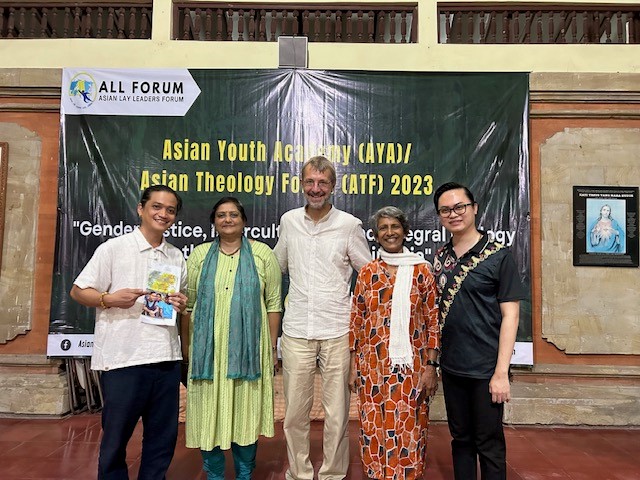Before and during the Synod in Rome in October 2023 there will be many events, meetings and vigils organized by reform groups and networks from all over the world. We present ourselves as a colourful broad mosaic of reforming initiatives accompanying the Synod.
From experience of the Pan-Amazonian Synod we know, however, that alongside the work inside the synod hall, the activities that take place outside are important and contribute to creating 'the climate' in which the synod takes place.
To make the coming Synod as successful as possible we compiled a list of all reform events, meetings and vigils in Rome in October 2023, that we know of.
Listing of Reform activities during the Synod in Rome in October 2023 - see below
During the Synod, the following persons will be at your disposal for interviews and further
information in Rome:
| Colm Holmes, Chair We are Church International (in Rome: October 12-16) Email: Dr Martha Heizer, Vice-Chair We are Church International (in Rome: October 12-16) Christian Weisner, We Are Church Germany (in Rome: October 3-5, 12-17, 29) |
|
3 October |
Women’s Ordination Worldwide WOW drinks/apericena reception for friends of Women’s Ordination Worldwide and press Following the prayer service VENUE TO BE CONFIRMED NEARER THE TIME |
|
4 October |
Women’s Ordination Conference WOC with Women's Ordination Worldwide WOW Enlarging the Space of the Tent contact: Kate McElwee at contact: Miriam Duignan at |
|
6 October |
Women’s Ordination Conference WOC with Women's Ordination Worldwide “Walk with Women” a procession through Rome to the synod hall, calling the church to "Walk with Women." https://www.womensordination.org/womens-ordination-conference-in-rome/ contact: Kate McElwee at |
|
8-12 October |
Spirit Unbounded "Human Rights in the Catholic Church" Online https://spiritunbounded.org/event |
|
8-16 October |
DACHS network (youth organisations from Switzerland, Austria, Germany and South Tyrol) They will express their concerns in meetings with bishops, synod participants and other network and interest partners https://fachstelle.info/einblicke-okj/38-einblicke-okj-2/177-dachs-bau-in-rom.html contact: |
|
10 October - 1pm - 4pm Also available via Zoom |
Catholic Women’s Council CWC Women from the Synod to share their experiences at the Synod. International House of Women: Via della Lungara, 19, 00165 Roma |
|
11 October 9am-4pm |
Association of Roman Catholic Women Priests (ARCWP) hosting a full day of presentations and conversations Casa Bonus Pastor, Via Aurelia, 208 - 00165 https://arcwp.org/wp-content/uploads/2023/07/Rome-FLyer-Save-the-Date.pdf Contact: Bridget Mary Meehan at and Mary Theresa Streck at |
|
11 October |
Association of Roman Catholic Women Priests (ARCWP) & Catholic Women’s Council CWC Liturgy with a meet and greet afterwards Casa Bonus Pastor, Via Aurelia, 208 – 00165 Contact: Bridget Mary Meehan at and Mary Theresa Streck at |
|
12 October |
We Are Church International EQUALITY Public Witness
|
|
13-14 October, Rome, Bristol and online |
Spirit Unbounded “Human Rights in the Catholic Church” Rome, Bristol and online https://spiritunbounded.org/event contact: |
|
15-16 October |
We are Church International “Equality of all” WAC International General Meeting / Biennial Conference Casa Bonus Pastor https://www.we-are-church.org/123/index.php/latest-news2/872-wacmeet-20230726 contact: |




